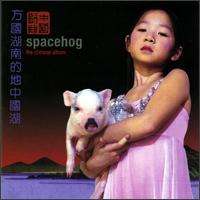The Chinese Album
| The Chinese Album | ||||
|---|---|---|---|---|
 | ||||
| Studio album by Spacehog | ||||
| Released | March 10, 1998 | |||
| Genre | Glam rock | |||
| Length | 41:40 | |||
| Label |
Sire Records Warner Bros. Records | |||
| Producer | Bryce Goggin & Spacehog | |||
| Spacehog chronology | ||||
| ||||
| Professional ratings | |
|---|---|
| Review scores | |
| Source | Rating |
| Allmusic | |
| Pitchfork Media | (5.4/10)[1] |
The Chinese Album is the second album from the expatriate British alternative rock band Spacehog. It was released on Sire Records on March 10, 1998.
The Chinese Album was considered for a soundtrack and basis of a film called Mungo City (later called The Chinese Movie). It was to be about a band that moves to Hong Kong for success after being rejected by a New York record company. Unsatisfied with the final script, Spacehog dismissed any plans for shooting.
Spacehog wrote and recorded 20 songs for The Chinese Album. Among these are the B-sides "Final Frontier", "Isle of Manhattan" and "Cryogenic Lover" which were released as European singles.
Track listing
All songs by Royston Langdon except when noted.
- "One Of These Days" (David Byrne, Jerry Harrison, Tina Weymouth, Chris Frantz, Brian Eno, Royston Langdon) - 3:35
- "Goodbye Violet Race" - 4:00
- "Lucy's Shoe" - 4:13
- "Mungo City" - 4:34
- "Skylark" (Antony Langdon) -1:57
- "Sand In Your Eyes" - 3:49
- "Captain Freeman" (Antony Langdon) - 2:27
- "2nd Avenue" (Royston Langdon, N. Chassler)- 2:58
- "Almond Kisses" (featuring Michael Stipe) (Antony Langdon) - 2:44
- "Carry On" - 3:33
- "Anonymous" (Royston Langdon, Antony Langdon) - 3:37
- "Beautiful Girl" - 4:09
Personnel
- Royston Langdon - bass guitar and vocals
- Antony Langdon - guitar and vocals
- Jonny Cragg - drums
- Richard Steel - lead guitar
- The beginning of "Mungo City" references the Ministry of Plenty from Nineteen Eighty-Four.
Samples
- "One of These Days" contains a sample of "Seen and Not Seen" by Talking Heads from their 1980 album Remain in Light.
References
- ↑ DiCrescenzo, Brent. "Spacehog:The Chinese Album". Archived from the original on 8 March 2008. Retrieved 2 May 2013.
This article is issued from Wikipedia - version of the 9/3/2016. The text is available under the Creative Commons Attribution/Share Alike but additional terms may apply for the media files.